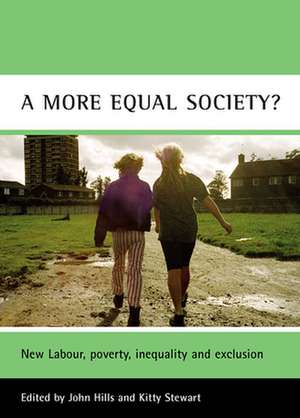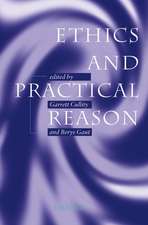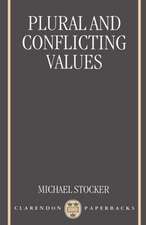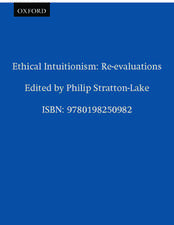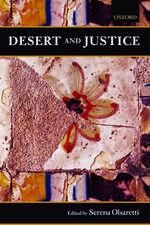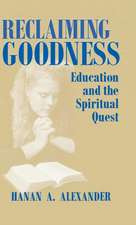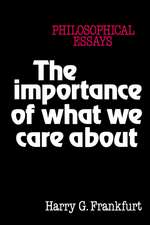A more equal society? – New Labour, poverty, inequ ality and exclusion: CASE Studies on Poverty, Place and Policy
Autor John Hillsen Limba Engleză Paperback – 11 ian 2005
This major new book provides, for the first time, a detailed evaluation of policies on poverty and social exclusion since 1997, and their effects. Bringing together leading experts in the field, it considers the challenges the government has faced, the policies chosen and the targets set in order to assess results. Drawing on research from the Centre for Analysis of Social Exclusion, and on external evaluations, the book [vbTab]asks how children, older people, poor neighbourhoods, ethnic minorities and other vulnerable groups have fared under New Labour and seeks to assess the government both on its own terms - in meeting its own targets - and according to alternative views of social exclusion.
Din seria CASE Studies on Poverty, Place and Policy
-
 Preț: 332.39 lei
Preț: 332.39 lei -
 Preț: 328.02 lei
Preț: 328.02 lei -
 Preț: 350.52 lei
Preț: 350.52 lei -
 Preț: 331.33 lei
Preț: 331.33 lei -
 Preț: 329.41 lei
Preț: 329.41 lei -
 Preț: 334.62 lei
Preț: 334.62 lei -
 Preț: 331.33 lei
Preț: 331.33 lei -
 Preț: 321.71 lei
Preț: 321.71 lei - 23%
 Preț: 778.12 lei
Preț: 778.12 lei -
 Preț: 502.16 lei
Preț: 502.16 lei -
 Preț: 280.18 lei
Preț: 280.18 lei
Preț: 370.23 lei
Nou
Puncte Express: 555
Preț estimativ în valută:
70.84€ • 74.16$ • 58.62£
70.84€ • 74.16$ • 58.62£
Carte tipărită la comandă
Livrare economică 05-19 aprilie
Preluare comenzi: 021 569.72.76
Specificații
ISBN-13: 9781861345776
ISBN-10: 1861345771
Pagini: 408
Ilustrații: illustrations
Dimensiuni: 172 x 240 x 24 mm
Greutate: 0.68 kg
Ediția:New.
Editura: Bristol University Press
Seria CASE Studies on Poverty, Place and Policy
Locul publicării:United Kingdom
ISBN-10: 1861345771
Pagini: 408
Ilustrații: illustrations
Dimensiuni: 172 x 240 x 24 mm
Greutate: 0.68 kg
Ediția:New.
Editura: Bristol University Press
Seria CASE Studies on Poverty, Place and Policy
Locul publicării:United Kingdom
Recenzii
A comprehensive and authoritative analysis of what New Labour's welfare reforms have achieved to date. Alan Deacon, School of Sociology and Social Policy, University of Leeds
... this is a very good collection, not least for the range of issues explored and the wealth of information it provides. It deserves to be widely used by policy-makers, students and researchers. Urban Studies"... for a more informed understanding of just what has been happening since 1997, it is a great read." Regeneration & Renewal
... the LSE's mighty judgement on inequality: John Hills and Kitty Stewart's A more equal society? is the definitive text. Polly Toynbee, The Guardian
... this is a book that commands and deserves attention. It is the kind of publication that helps to renew my faith in the value of scholarly analysis of social policy. Policy World
Notă biografică
John Hills, Centre for Analysis of Social Exclusion, London School of Economics and Political Science and Kitty Stewart, Centre for Analysis of Social Exclusion, London School of Economics and Political Science
Cuprins
List of figures and tables
Acknowledgements
Notes on contributors
1. Introduction
Kitty Stewart and John Hills
Part One: Aspects of exclusion
2. Employment: tackling poverty through ‘work for those who can’
Abigail McKnight
3. Education, education, education . . . : an assessment of Labour’s success in tackling education inequalities
Abigail McKnight, Howard Glennerster and Ruth Lupton
4. Tackling health inequalities
Franco Sassi
5. Social and political participation and inclusion
Liz Richardson
Part Two: Groups at risk
6. Disadvantaged by where you live? New Labour and neighourhood renewal
Ruth Lupton and Anne Power
7. Towards an equal start? Addressing childhood poverty and deprivation
Kitty Stewart
8. A secure retirement for all? Older people and New Labour
Maria Evandrou and Jane Falkingham
9. Ethnic inequalities under New Labour: progress or entrenchment?
Coretta Phillips
10. Selective inclusion: asylum seekers and other marginalised groups
Tania Burchardt
Part Three: Overall impact
11. Inequality and poverty under New Labour
Tom Sefton and Holly Sutherland
12. That’s the way the money goes: expenditure patterns as real incomes rise for the poorest families with children
Paul Gregg, Jane Waldfogel and Elizabeth Washbrook
13. Bringing up families in poor neighbourhoods under New Labour
Anne Power and Helen Willmot
14. Changes in poverty and inequality in the UK in international context
Kitty Stewart
Part Four: Conclusion
15. A tide turned but mountains yet to climb?
John Hills and Kitty Stewart
References
Index
Acknowledgements
Notes on contributors
1. Introduction
Kitty Stewart and John Hills
Part One: Aspects of exclusion
2. Employment: tackling poverty through ‘work for those who can’
Abigail McKnight
3. Education, education, education . . . : an assessment of Labour’s success in tackling education inequalities
Abigail McKnight, Howard Glennerster and Ruth Lupton
4. Tackling health inequalities
Franco Sassi
5. Social and political participation and inclusion
Liz Richardson
Part Two: Groups at risk
6. Disadvantaged by where you live? New Labour and neighourhood renewal
Ruth Lupton and Anne Power
7. Towards an equal start? Addressing childhood poverty and deprivation
Kitty Stewart
8. A secure retirement for all? Older people and New Labour
Maria Evandrou and Jane Falkingham
9. Ethnic inequalities under New Labour: progress or entrenchment?
Coretta Phillips
10. Selective inclusion: asylum seekers and other marginalised groups
Tania Burchardt
Part Three: Overall impact
11. Inequality and poverty under New Labour
Tom Sefton and Holly Sutherland
12. That’s the way the money goes: expenditure patterns as real incomes rise for the poorest families with children
Paul Gregg, Jane Waldfogel and Elizabeth Washbrook
13. Bringing up families in poor neighbourhoods under New Labour
Anne Power and Helen Willmot
14. Changes in poverty and inequality in the UK in international context
Kitty Stewart
Part Four: Conclusion
15. A tide turned but mountains yet to climb?
John Hills and Kitty Stewart
References
Index
